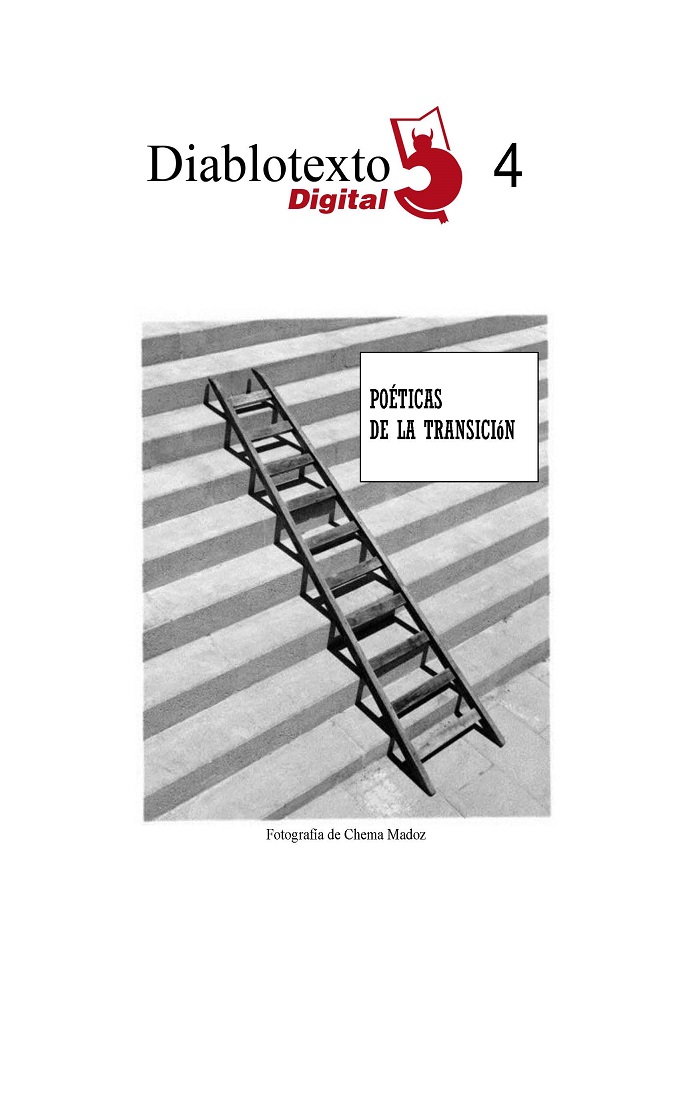Poetry from the end of History: Praga, by Manuel Vázquez Montalbán, and Cantil, by Antonio Martínez Sarrión
DOI:
https://doi.org/10.7203/diablotexto.4.15330Keywords:
Manuel Vázquez Montalbán, Antonio Martínez Sarrión, novísimos, end of history, consumer society, political disillusionment Abstract
Abstract
This paper analyzes two books of poems arising from the intellectual climate that justified Fukuyama’s prediction about the end of history. On the one hand, Manuel Vázquez Montalbán (Praga, 1982) built a discursive labyrinth in which the Czech city represented the metaphor for the crisis of communism, the utopian disenchantment, the fractured country and the private memory. On the other hand, Antonio Martínez Sarrión (Cantil, 1995) proposed an allegorical journey that went back to the origins of Nazism and to the ekphrastic description of the picture The Island of the Dead, by Arnold Böcklin, in order to denounce the self-destruction of a world that has evolved from totalitarianism to consumer society. Separated by the symbolic bisector of the year 1989, Praga and Cantil came in from the cold ?the inclemency of political disillusionment in the former, and the disappointment derived from any civilizing project in the latter? to rewrite history from the end of history.
 Downloads
Downloads
 References
References
Benjamin, Walter (1980). Imaginación y sociedad. Iluminaciones 1. Madrid: Taurus. Traducción de Jesús Aguirre.
Campbell, Federico (ed.) (1971). Infame turba. Barcelona: Lumen.
Castellet, José María [1986-2008] (2018). “Introducción”. En Manuel Vázquez Montalbán, Poesía completa. Memoria y deseo (1963-2003). Madrid: Visor, pp. 7-38.
Colmeiro, José F. (2007). “En busca de los imaginarios perdidos: entrevista con Manuel Vázquez Montalbán”. En José F. Colmeiro (ed.), Manuel Vázquez Montalbán. El compromiso con la memoria. Londres / Nueva York: Tamesis, pp. 279-296.
Ferrari, Marta (2017). “La ciudad de la memoria. En torno a Praga, de Manuel Vázquez Montalbán”, Pasavento. Revista de Estudios Hispánicos (verano), vol. V, n.º 2, pp. 275-289.
Fukuyama, Francis [1989] (1990). “¿El fin de la historia?”, Claves de Razón Práctica (abril), n.º 1, pp. 85‑96.
Fukuyama, Francis (1992). El fin de la historia y el último hombre. Barcelona: Planeta. Traducción de P. Elías.
García de León, Encarnación (1998). “Variaciones literarias de un mito: la barca de los muertos”, Barcarola. Revista de Creación Literaria (diciembre), n.º 56-57, pp. 389-395.
Gracia, Jordi (1996). “Impugnación poética de Popper”, El Ciervo. Revista Mensual de Pensamiento y Cultura (febrero), n.º 539, p. 32.
Lafarque, Antonio y Lorenzo Saval (2018). Islas. Arte & Literatura [monográfico de Litoral. Revista de Poesía, Arte y Pensamiento, n.º 266].
Lanz, Juan José (2002). “Poesía y compromiso en la generación del 68. La renovación estética de los sesenta y el compromiso poético en tres poetas: Agustín Delgado, Manuel Vázquez Montalbán y José-Miguel Ullán”. En Martín Muelas Herraiz y Juan José Gómez Brihuega (eds.), Leer y entender la poesía: conciencia y compromiso poéticos. Cuenca: Universidad de Castilla-La Mancha, pp. 165-218.
Martínez Sarrión, Antonio (2003). Última fe. Antología poética, 1965-1999. Madrid: Cátedra. Edición de Ángel L. Prieto de Paula.
Prieto de Paula, Ángel L. (2003). “Introducción”. En Antonio Martínez Sarrión, Última fe. Antología poética, 1965-1999. Madrid: Cátedra, pp. 13-127.
Rico, Manuel (2005). “Manuel Vázquez Montalbán, el poeta», Turia. Revista Cultural (marzo-mayo), n.º 73-74, pp. 13-20.
Tyras, Georges (2007). “Entre memoria y deseo: la poética de la huida en la obra de Vázquez Montalbán”. En José F. Colmeiro (ed.), Manuel Vázquez Montalbán. El compromiso con la memoria. Londres / Nueva York: Tamesis, pp. 105-116.
Vázquez Montalbán, Manuel (2018). Poesía completa. Memoria y deseo (1963-2003). Madrid: Visor.
Vernon, Kathleen M. (2007). “Memoria histórica y cultura popular: Vázquez Montalbán y la resistencia española”. En José F. Colmeiro (ed.), Manuel Vázquez Montalbán. El compromiso con la memoria. Londres / Nueva York: Tamesis, pp. 21-33.
Downloads
Published
How to Cite
-
Abstract391
-
PDF (Español)312
Issue
Section
License
Licencia de reconocimiento de Creative Commons “Reconocimiento - No Comercia l- Sin Obra Derivada
Authors who publish with this journal agree to the following items:
The authors will keep their copyright and guarantee the journal the right of first publication of their work, which will be simultaneously subject to the Creative Commons license that allows third parties to share the work indicating its author and its first publication in the journal. The authors may adopt other non-exclusive license agreements to distribute the version of the published work (e.g., depositing it in an institutional telematic file or publishing it in a monographic volume), with an acknowledgment of its initial publication in this journal. The authors are allowed and encouraged to disseminate their work through the Internet (e.g., in institutional telematic archives or on their website) before and during the submission process, which can produce interesting exchanges and increase citations of the published work. (See Effect of Open Access)




